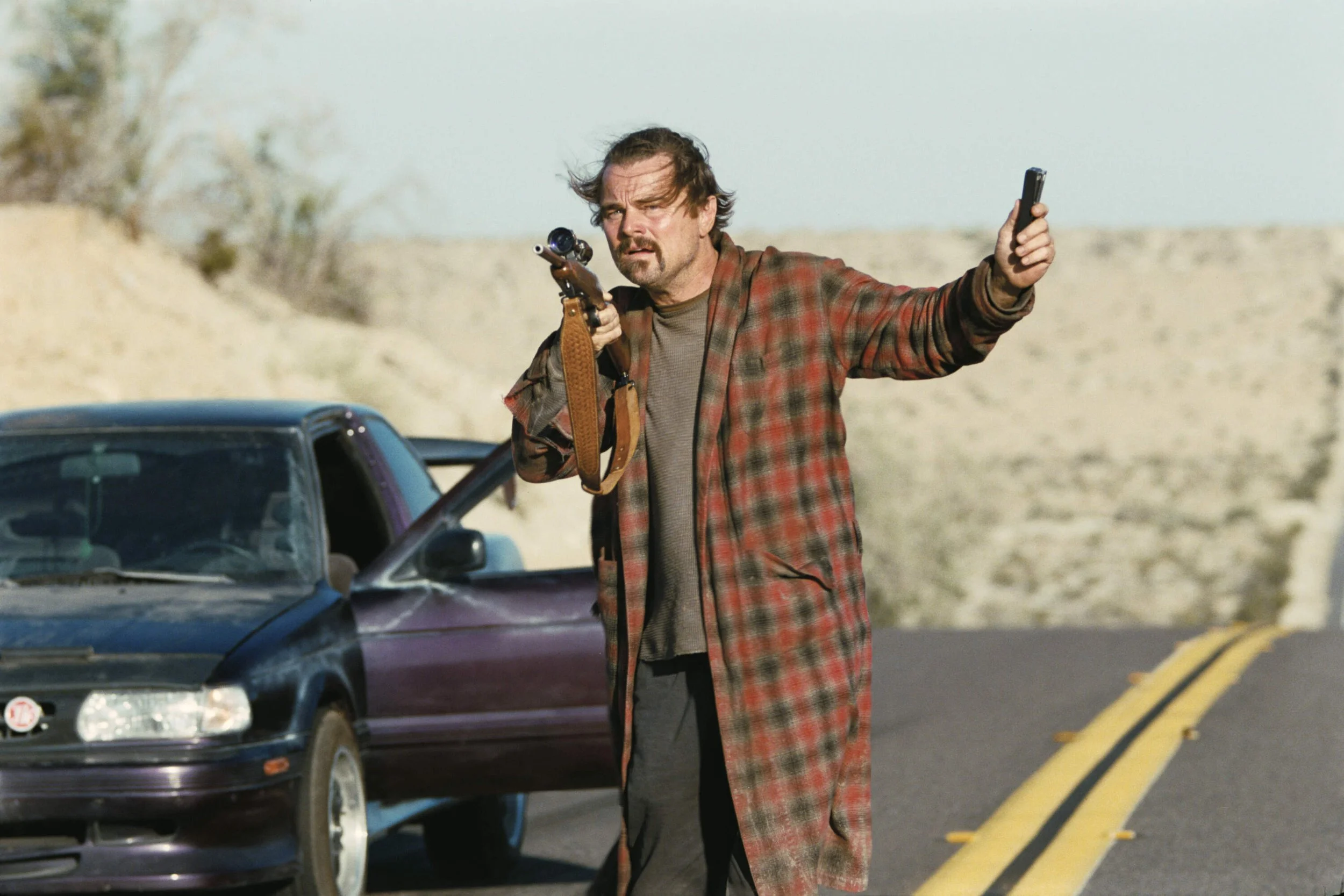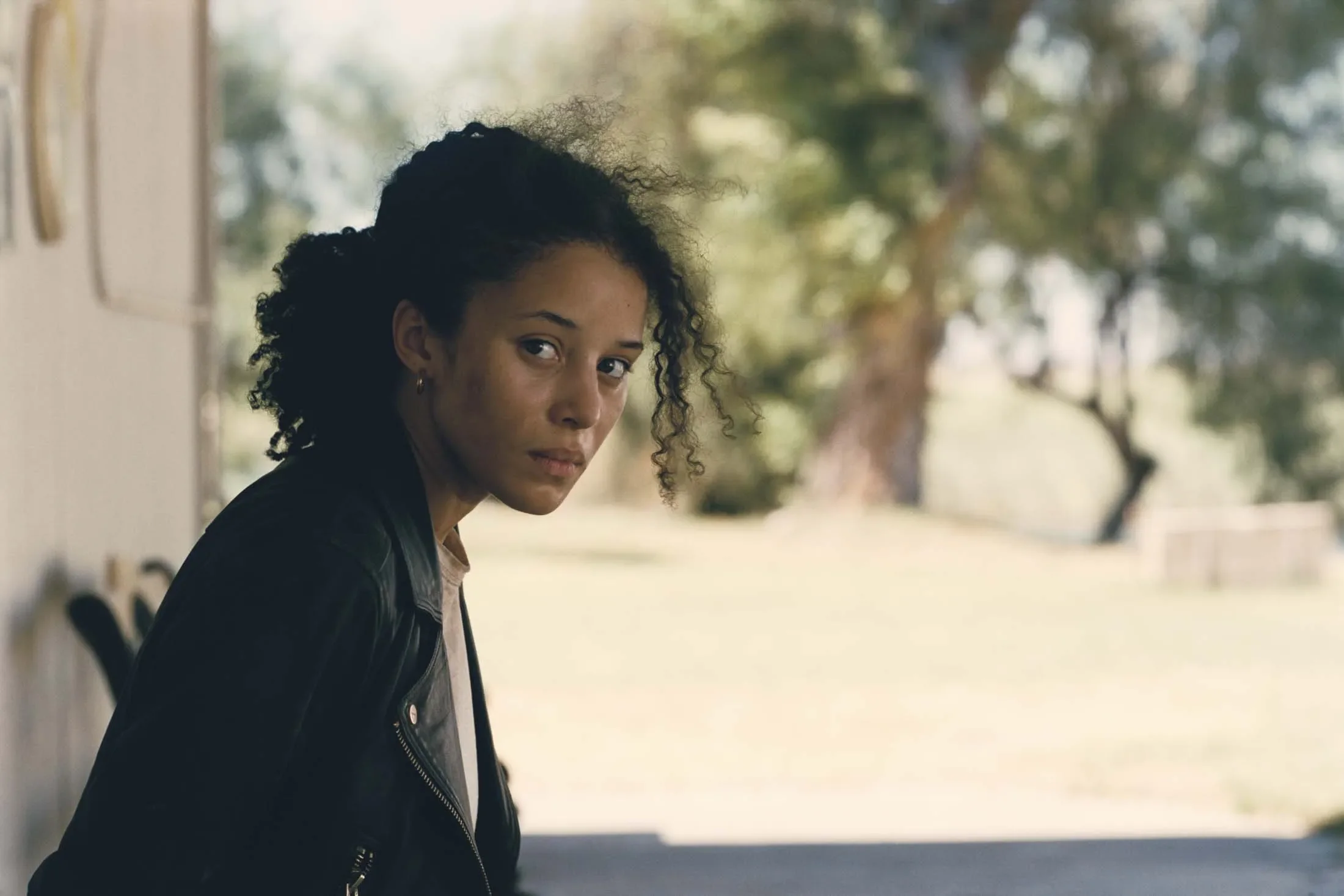‘One Battle After Another’: Emotion Through Propulsion
Paul Thomas Anderson’s tenth feature, One Battle After Another, is a propulsive yet humble reflection on the times that prioritizes a humanist perspective on revolution, community, family, and change. Loosely adapted from Thomas Pynchon’s Vineland, this is easily the acclaimed auteur’s most accessible film, through both its spectacle and the fact that it’s an action film with Leonardo DiCaprio. Despite this, it does not compromise any of the storytelling.
The story concerns itself with revolutionary foot soldier-turned-escapee Bob Ferguson/“Ghetto Pat” (Leonardo DiCaprio), the dazzling Perfidia Beverly Hills (Teyana Taylor), and the French 75, a revolutionary group that, at the beginning of the film, helps migrants being held at a detention center escape. Colonel Lockjaw (Sean Penn) runs the center, and Perfidia instantly notices his attraction towards her and uses it to manipulate him. Meanwhile, Ghetto Pat helplessly falls in love with Perfidia. After she becomes pregnant, he holds an image of family in his mind that evaporates as Perfidia becomes unhappy that his attention has shifted to the baby. This theme of postpartum depression in such a strong character adds a depth, vulnerability and heartbreak to a mother figure, the topic of motherhood hasn’t been explored by Anderson since Julianne Moore’s performance as Amber Waves in Boogie Nights as a pornstar mother who is in the middle of a custody battle.
What interests me in Perfidia is that in both her dynamic with Ghetto Pat and with Lockjaw, power is at play. One is a man who holds the exact power in the US Military that the French 75 are fighting against — for Perfidia, the idea that she is capable of enchanting the enemy through sex is intoxicating for her in spite of Lockjaw being a genuine threat to her personal safety and ideology, as well as the safety of endless victims of the state. Yet she can control him. Her attraction to Lockjaw doesn’t appear to be physical or emotional, as much as she likes that her sexuality is more powerful than any gun can be. Meanwhile, with Ghetto Pat, a member of Perfidia’s revolutionary community, falls in line when she wants him to, which ends when his priorities shift to their child. Teyana Taylor’s performance is mournful, electric, and heartbreaking, and gives us one of the auteur’s most spellbinding characters. The opening scene of the film follows her walking over the detention center as the sometimes-orchestral-but-mostly-jingling Johnny Greenwood score blares. Not for one second do you wonder why both Pat and Lockjaw are obsessed with her. The movie is uninterested in judging her, when she ultimately finds herself in a situation where she must choose between a life in prison or snitching on her team. She makes the decision to choose herself over any power or ideology. This leads to many of her comrades ending up in jail, transitioning the film into a father-daughter epic, as the movie flashes forward to the present day and we are introduced to their daughter, Willa.
When we meet Bob Ferguson again, he is a burnout, a single dad basically being raised by his more intelligent and clear-headed daughter. The man who was once chasing Perfidia around like a lovesick puppy has to take charge, and he instead chooses paranoia, drugs, and alcohol to ease the experience of parenting, giving us one of DiCaprio’s most enjoyable performances of late. Bob seems useless, but his love of his daughter and the intensity of his fear and circumstances put him back in his old revolutionary boots, the film turns into Bob being both on the run from Lockjaw and trying to reunite with Willa. The audience is granted access to the world and community of Bakton Cross, and we are introduced to Willa’s sensei: Sergio St. Carlos (Benicio del Toro), his saviour and biggest help. Establishing a community like the one of Bakton Cross on screen in a sprawling epic film like this one, pushes forward the necessity of human connection in times of struggle.
Sergio and French 75 member DeAndra (Regina Hall) are the supporting performances the movie stands on. Lockjaw is an incredibly gruesome villain, but the comedic and emotional relief sensei brings throughout the film is invaluable . Benicio del Toro masters depicting a tranquil and warm presence that is necessary for a character and world that is constantly threatened by calamity. He is a pillar for his community, no matter how many small beer cans find their way into his grip. Regina Hall does something equally important yet different; the only problem with her presence in the film is that there isn’t enough of it. DeAndra represents the revolutionary who does everything right, is responsible. She remains as a guardian angel for Willa’s character later in the film. The movie doesn’t explore her personal life beyond the organization, but I suspect, just through the sheer emotionality in Regina Hall’s tremendous performance, that DeAndra is a character who has dedicated herself endlessly to the resistance, that she sacrificed her whole life for justice and a better world.
One Battle After Another is Anderson’s first film set in contemporary times since 2002’s Punch-Drunk Love, removing the safety blanket of historical pieces. What makes this film stand out in comparison to the rest of his filmography is not only the blockbuster element but the return of playful camera movement to match up to the frantic lives of the French 75. What was once used to depict the flashy rise and fall of Dirk Diggler in Boogie Nights is brought back in a context that, despite spectacle, doesn’t feel flashy at all or like homage to the great influences that came before him, as it is tied together with characters’ emotional intimacies and journeys throughout the film. Balancing the tonality of a hilarious and scatterbrained older Bob as we weave through endless obstacles alongside him, with some of the emotional torment that is expressed through Regina Hall’s sincere and heartbroken big brown eyes as Anderson commits to several Demme-like close-ups.
What is achieved with the careful crafting of this film is a tender and urgent sensation of cinema, gifting us with a story that creates a bridge of forgiveness between several generations. It doesn't let you breathe, and yet the warmth, humanity, and tenderness are reflected on the viewer like a hush of sunlight through the blinds. An emotional and tonal fusion, the film stands as another masterpiece within the auteur’s catalogue and a hypnotic theatrical experience.



